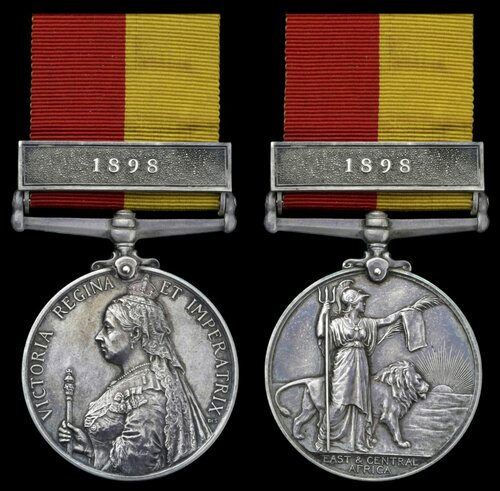
Auction: 20003 - Orders, Decorations and Medals
Lot: 885
A rare East and Central Africa Medal awarded to Dr. D. Donald, a Medical Officer of the Uganda Protectorate who saw action with 1st Battalion, Uganda Rifles in the Jubaland Expedition of 1898
He subsequently rose to the rank of Lieutenant-Colonel in the Canadian Army Medical Corps in the Great War and was brought to the notice of the Secretary of State for War for his 'devotion to duty in the care and rescue of patients' from the hospital ship Letitia when wrecked off Halifax, Nova Scotia in August 1917
East and Central Africa 1897-99, 1 clasp, 1898 (Dr. D. Donald, 1/Uganda Rif.), very fine
David Donald was born in Aberdeen, Scotland on 14 August 1866 and qualified in medicine at Edinburgh in August 1892, where he was a Gold Medallist. In addition to being appointed L.R.C.P. and L.R.C.S. (Edinburgh), he became a Licentiate of the Faculty of Physicians and Surgeons (Glasgow) in the same year.
Uganda - Black Water Fever
In 1897, he was appointed a Medical Officer in Uganda, where he was attached to the Indian Army and held a special Foreign Office commission. In her autobiography Alongside the Navy, his daughter, Jean Gow, stated:
'His duty was to give medical aid to the natives of a vast region, mainly, I think, around Lake Nyanza. The natives were dying of smallpox and my father was the first white man and first doctor they had ever seen. After three years he contracted black water fever, so returned to England.'
But not before serving on attachment as M.O. to the 1st Uganda Rifles in the Somaliland Expedition of 1898 (Medal & clasp); he later published a paper in the Lancet, 'Blackwater Fever Treated Without Quinine' (1905).
Donald next held an appointment as Deputy Medical Officer at Aldershot but, in August 1910, he and his family moved to Canada, where he set up a private medical practice at Victoria.
The Great War
In September 1914, he attested for the Canadian Overseas Expeditionary Force and was appointed a Major in the Canadian Army Medical Corps.
Having been created an Esquire of the Order of St. John of Jerusalem in August 1916, and held various posts in the U.K., he was appointed Officer Commanding of the hospital ship Letitia in April 1917. It was in this capacity that he was brought to the notice of the Secretary of State for War for his 'devotion to duty in the care and rescue of patients' when she was wrecked off Halifax, Nova Scotia in August of the same year (War Office List, 7 August 1917, refers).
He subsequently served in another hospital ship, the Araguaya, but returned to the U.K. at the end of 1917 and was posted to France, where he took command of No. 2 Canadian Stationary Hospital in April 1918; he was mentioned in despatches (London Gazette 28 May 1918, refers).
On 1 August 1918, however, his active service career came to an end, an exploding bomb causing him injuries to his chest and shoulder, including a fractured rib. He was evacuated to No. 8 Red Cross Hospital at Boulogne and embarked for England a few days later. Treated at the Royal Free Hospital in London and another establishment at Hyde Park Place, he was embarked for Canada in mid-December 1918 and finally discharged at Ottawa in 1920.
The Colonel served as Medical Health Officer for schools in Victoria for the next 13 years and he died there on 2 February 1936; sold with a file of research.
Subject to 20% VAT on Buyer’s Premium. For more information please view Terms and Conditions for Buyers.
Sold for
£1,100
Starting price
£450




